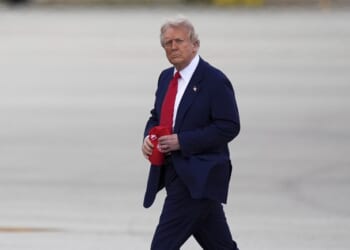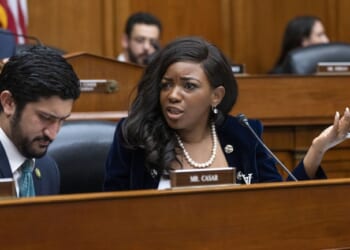Wyoming was among the first states to enact a citizenship verification law and to ban foreign funding of ballot measures during the 2025 session, along with other election reform bills.
“Wyoming’s been a leader. We’ve had very clean elections, and you can always improve them, so I’m very proud of our integrity,” Wyoming Gov. Mark Gordon, a Republican, told The Daily Signal.
Gordon and Secretary of State Chuck Gray–who oversees elections in the state–have been on the same page on most fronts regarding election integrity bills. But the two Republican officials have clashed on a key measure.
Wyoming became the first state in the nation to require proof of citizenship for registering to vote for national and state elections, Gray said. The bill also institutes a 30-day residency requirement. House Bill 156 passed the Wyoming House 51-8 and passed the Senate 26-4. The legislation was Gray’s first priority.
“Only U.S. citizens and Wyoming residents should vote in our elections,” Gray told The Daily Signal. “We need to create a procedure to keep illegal aliens from voting. I wanted to do a SAVE Act at the state level.”
The SAVE Act is a bill in Congress, short for the Safeguard American Voter Eligibility, which would require proof of citizenship for voter registration. The measure passed the Republican-controlled U.S. House last year but did not come to a vote in the U.S. Senate.
The Wyoming proof of citizenship bill became law without Gordon’s signature, as the governor said he is concerned about “unintended consequences” of the measure he opted not to sign.
An alleged illegal immigrant, Christian Lopez in Campbell County, Wyoming, was reportedly removed from the voter rolls after voting in Wyoming in 2020. He remained on the state’s voter rolls as a registered Republican until he was removed in August 2023. Last September, Gordon issued an executive order directing state agencies and election officials to take steps to prevent noncitizen voting.
Gray said this had been a “two-year standoff” with the governor.
“I’m glad he backed down from the outrageously leftwing position he had,” Gray said of the governor.
Gordon said it was a laudatory goal, but said he was concerned the 30-day residency requirement wouldn’t hold up in court. Gordon noted that 52 U.S. Code 10502 says no citizen who has otherwise qualified to vote in any election for president or vice president shall be denied the right to vote.
“I’ve mentioned that over and over again, our [state] constitution provides for a year of residency. But that federal statute is the one that could prove problematic,” the governor said.
My book “The Myth of Voter Suppression” details the impact of voter registration fraud in other states, including noncitizens and illegal immigrants voting.
Gordon signed a slew of other bills that Gray had pushed for, including banning private funding of election administration, prohibiting foreign funding of ballot initiatives, and a ban on ranked choice voting.
Gray announced a 10-point election integrity agenda in January, and said six of those proposals became law.
“This session, I think we have taken the lead on election integrity in 2025,” Gray said. “A lot of red states have Republican parties that are infiltrated by the Left. But we have a Freedom Caucus majority in the Legislature now.”
House Bill 337 prohibits foreign funding of state ballot initiatives, closing a loophole to block indirect foreign funding of ballot initiatives. It is already illegal in most states for foreign residents and entities to contribute to U.S. political candidates. Ohio was the first state in the nation to ban direct and indirect foreign contributions for ballot measures. Wyoming was the first state this year to do so. Kentucky and Kansas followed, and other states are expected to pass bans.
“We banned foreign funding of elections, just the second state in the nation to close that loophole created from an FEC decision,” Gray said.
Gray was referring to an issue that emerged from a neighboring state. The Federal Election Commission dismissed a 2021 complaint that Australian mining company Sandfire Resources contributed over $280,000 to defeat a Montana ballot initiative that would have increased the power of state mining regulators.
Dark money sources are a concern for every state, Gordon said.
“So much of our elections at this point I think are affected by the contributions that come in and the dark money. So yes, I think that was a very, very important issue for us to take on,” Gordon said.
House Bill 165 banned ranked choice voting. This is a method adopted by some cities and counties, including for the New York City primary elections. Both Alaska and Maine also have a statewide system for primary and general elections. It allows voters to rank multiple candidates, with lowest performing candidates being eliminated. After multiple rounds of counting votes, a winner is determined. Under this system, the candidate who led in the first round of voting could end up losing.
“Ranked choice voting really is a bad scheme,” Gray said. “It has been talked about for local elections. We nipped it in the bud.”
This system would not be a good fit for the state, Gordon said,
“I don’t think ranked choice really has much of a role to play here in Wyoming, and I think it just kind of would confuse a lot of voters,” Gordon said. “So, yeah, I think … we’re not going to see that.”
Heritage Action for America supported both Wyoming’s ban on foreign funding as well as the ban on ranked choice voting.
“Ranked-choice voting is nothing more than a gimmick that undermines our democratic process, disenfranchises voters, and makes it harder for Americans to have their voices heard. And Wyoming voters should be the ones determining the outcome of its constitution, not foreign nationals,” Catherine Gunsalus, former Kansas assistant secretary of state and now the Heritage Action director of state advocacy, said in a public statement.
“Ranked-choice voting is nothing more than a gimmick that undermines our democratic process, disenfranchises voters, and makes it harder for Americans to have their voices heard. And Wyoming voters should be the ones determining the outcome of its constitution, not foreign nationals.”
House Bill 228 prohibited private funds from financing election administration. This practice is sometimes referred to as “Zuckerbucks,” because Facebook founder Mark Zuckerberg spent about $400 million to aid local election offices in 2020–and many critics said the money went disproportionately to Democrat areas.
House Bill 318 strengthens voter list maintenance laws. The bill specifies drivers licensing information be used to determine if a noncitizen is listed on Wyoming voter lists.
Senate File 78 prohibited the distribution of unsolicited ballot forms. The bill specified that no one other than a state or county election official can distribute absentee ballots. Senate File 33, signed by the governor, required a driver’s license to specify if a resident is not a U.S. citizen.







